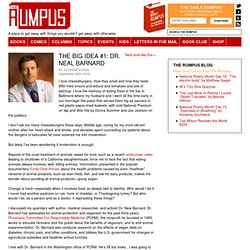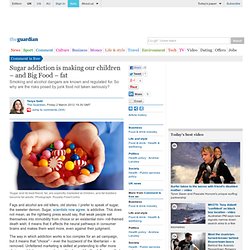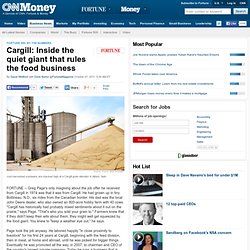

The Rumpus Interview With Dr. Neal Barnard. I love cheeseburgers.

How they smell and how they taste. With fried onions and lettuce and tomatoes and lots of ketchup. I love the memory of eating them in the bar in Baltimore where my husband and I went all the time early in our marriage–the place that served them big as saucers in red plastic paper-lined baskets, with cold National Premium on tap and ’80s hits by Donna Summer and Joe Jackson on the jukebox. I don’t eat too many cheeseburgers these days. Middle age, caring for my once-vibrant mother after her heart attack and stroke, and decades spent counseling my patients about the dangers of saturated fat have sobered me into moderation. But lately I’ve been wondering if moderation is enough. Reports of the cruel treatment of animals raised for food, such as a recent undercover video leading to shutdown of a California slaughterhouse, force me to face the fact that eating animals always involves, well, killing animals. I met with Dr. He’s an excellent advertisement for a vegan diet.
Sugar addiction is making our children – and Big Food – fat. 'Sugar and its best friend, fat, are explicitly marketed at children, and fat toddlers become fat adults.' Photograph: Royalty-Free/Corbis Fags and alcohol are old killers, old stories.

I prefer to speak of sugar, the sweeter demon. Sugar, scientists now agree, is addictive. This does not mean, as the rightwing press would say, that weak people eat themselves into immobility from choice or an existential mini- roll-themed death wish; it means that it affects the neural pathways in consumer brains and makes them want more, even against their judgment.
The way in which addiction works is too complex for an ad campaign, but it means that "choice" – ever the buzzword of the libertarian – is removed. Global consumption of sugar has tripled in the last 50 years, creating an obesity pandemic. But sugar and its best friend, fat, are explicitly marketed at children, and fat toddlers become fat adults, drains on the state, Jeremy Kyle guests and, eventually, bed-blockers. What now? Recipes. Cargill: Inside the quiet giant that rules the food business - Oct. 27. Just-harvested soybeans are stacked high at a Cargill grain elevator in Albion, Neb.

FORTUNE -- Greg Page's only misgiving about the job offer he received from Cargill in 1974 was that it was from Cargill. He had grown up in tiny Bottineau, N.D., six miles from the Canadian border. His dad was the local John Deere dealer, who also owned an 800-acre hobby farm with 40 cows. "Cargill has historically had probably mixed sentiments about it out on the prairie," says Page. "That's who you sold your grain to. " Page took the job anyway. With $119.5 billion in revenues in its most recent fiscal year, ended May 31, Cargill is bigger by half than its nearest publicly held rival in the food production industry, Archer Daniels Midland (ADM, Fortune 500). But those numbers alone don't begin to capture the scope of Cargill's impact on our daily lives.
Despite Cargill's extraordinary size, strength, and breadth, it has long been remarkably successful at keeping out of the public eye. No slowing down.